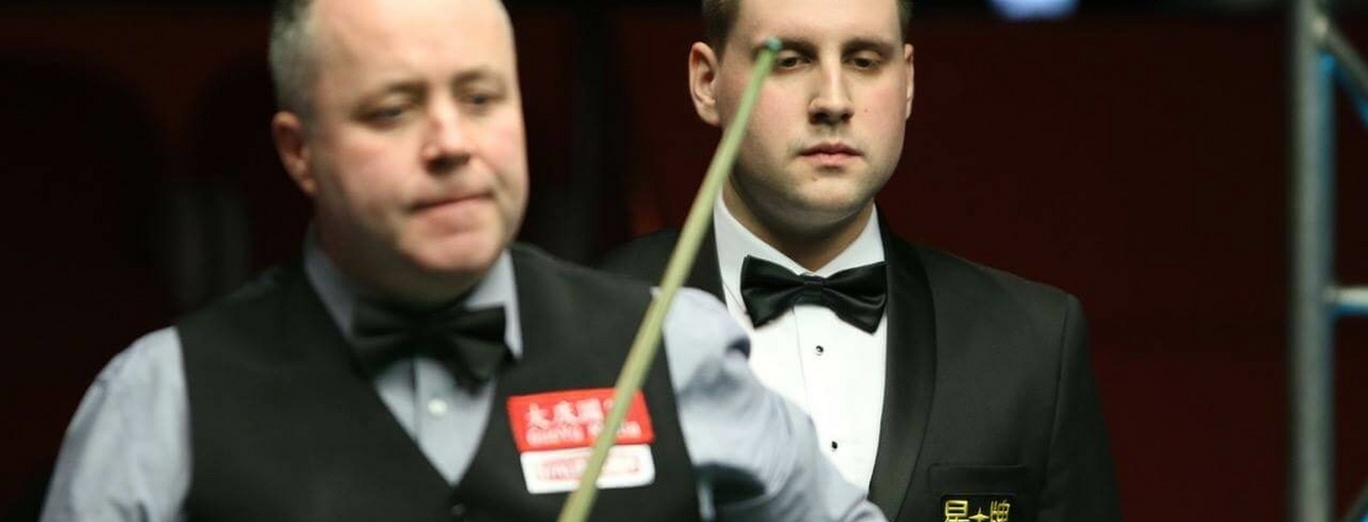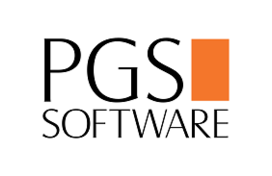Meet our people: Kevin Dabrowski, the Professional Snooker Referee

Kevin Dabrowski, copywriter at our HQ in Wroclaw, has had many stints in his professional career – he worked in the video game industry and wrote scripts for commercials, among other things – but his interests go beyond just the digital world.
Since 2014, Kevin has been a professional snooker referee at the World Snooker Tour. The matches he refs can be seen on Eurosport and BBC. Before becoming a ref, he had multiple sporting achievements under his belt, like a few Polish championship medals, and was only 1 point short of winning the Polish Championship in English Billiards.
Kevin Dabrowski with John Higgins, four-time World Champion
Let’s start with a silly question: what is snooker, exactly?
KD: Those unfamiliar with this sport may associate it with a strong, sleep-inducing drug. Yet, this assumption is totally inaccurate. Snooker is actually a very popular discipline with a huge fanbase all around the globe. World Championship tickets sell out on the fly. Currently, it’s one of the most frequently watched sports on Eurosport.
The game is played on a massive, 12 feet table with 22 balls – 15 reds, 6 colours (assuming that red isn’t a colour!) and one white, called the cue ball. The objective of the game is to score more points than your opponent.
Points are scored by potting balls. The player needs to start with a red, which is worth only 1 point, and then pot one of the colours, worth from 2 (yellow) to 7 points (black). After a colour is potted, it gets respotted on its starting position on the table. Reds stay in the pockets, and after their all gone, colours need to be played in the correct order, no longer being respotted. As I mentioned, the player with the higher score wins, and that’s a big difference in comparison to other billiard sports like 8-ball or 9-ball, where potting a specific ball win’s the game.
Since it’s points that determine the winner, a game can often finish when there are still balls on the table. A professional snooker match usually takes from 2 to 4 hours and is played on a best of 7 modus. However, at the most important events the distance is often longer. For example, to win the final of a World Snooker Championship, a player must get 18 frames on their board. As a result, such a match is usually played longer that one day.
How did you become a snooker referee?
KD: First, I started playing. I was potting my first balls at the SnookerKlub in Toruń. To play, I needed to travel 50 kilometres from my hometown of Bydgoszcz; although it’s a big city, it didn’t have a snooker table (and after 10 years this still hasn’t changed). Later on, I moved to Kraków to study, and that made it easier.
I wasn’t great at first, but I wanted to experience some high-quality snooker, so I took a refereeing course and planned on working at some of the biggest tournaments in Poland. I got invited to the Polish Championships very quickly – I think it was in 2011 – which was a huge stroke of luck, because back then, getting in was not a gimme.
Surprisingly, my playing skills got better not long after and I became good enough to be playing in the events I was refereeing at, so I stopped reffing and concentrated solely on competing. Ultimately, I won a few Polish Championship medals and even got to play in Poland’s top snooker league.
One day I decided to participate in a PTC event in Gdynia. I lost right away, which wasn’t really surprising – after all, I didn’t really play that well to be competing at a professional level; I was certain this concludes my involvement in the tournament, but the organizers approached me and asked if I would like to referee at the event. As it turned out, one of the officials got sick and couldn’t make it. So, I refereed at the event and liked it so much that I kept at it.
You joined the elite.
KD: Yes. Luckily my performance was good enough to be invited to some more events. This year, I had the pleasure of refereeing my first ranking event final at the 2020 Snooker Shoot-Out. Working at these events enabled me to travel to many interesting places, like, for example, the tiny, fascinating Gibraltar, which I would never have visited otherwise. Overall, I refereed at many interesting places in countries like Austria, Romania, Bulgaria, Germany, the UK, Latvia, and, of course, Poland. Although currently, there are no professional tournaments being held in my country.
What does a snooker referee do?
KD: A snooker referee’s main task is to make sure that the game is played with no infringement of the rules. This includes correctly respotting colours and looking out for potential fouls, which can often be hard to spot, but can change the course of the entire match. People unfamiliar to the sport are sometimes surprised that snooker has fouls, which are intuitively associated with physical contact, like a sliding tackle in football. In snooker, fouls are mainly the consequence of an incorrect shot, for example, pocketing the cue ball or making first contact with a ball that wasn’t nominated.
Other than that, the referee also does his best to make sure that the game is played smoothly. That’s why a referee’s positioning at the table is so important; the referee should always stand at the optimal position to be able to quickly retrieve a pocketed colour and replace it on the correct spot. Additionally, the referee also helps players with the rest (a type of help-cue) and oversees the score.
Since I already mentioned football, it’s also worth noting that compared to other sports, snooker is a very gentlemanly sport. Players have no problems with declaring fouls on themselves. And that’s crucial, because some infringements, like the push shot, for example – which means stroking the cue ball more than one time – is often impossible to spot by the referee. But the player will feel it instantly.
Do controversial situations also happen in snooker?
KD: They do, but rarely. Fair play and curtesy are part of snooker’s DNA. The most controversial situation I had to deal with involved asking a player to… tuck his shirt in. Those were the guidelines at that time, but it didn’t really go so smoothly, and it blew up on Twitter.
Other than that, there was also the famous non-handshake with Ronnie O’Sullivan, but it’s hard to view it as a controversy.
How is Poland doing in the snooker world?
KD: We have a few referees who frequently work at professional tournaments. Our country always had a strong referee representation.
When it comes to players, we had 2 players on the main tour last season, we also have a few top-amateur competitors who are good enough to turn professional in the coming years. Generally, I would say that the standard of play of the best Polish players is sky-high. In continental Europe, we’re a force to be reckoned with. Although we don’t have any big achievements in professional snooker yet, I believe it’s only a matter of time, or, strictly speaking, of mentality. Snooker is extremely difficult, and nerves or pressure can ruin your chances for success.
It’s worth adding that we already have some substantial achievement in the professional pool, so snooker should follow shortly.
You’re also in the centre of attention since your decisions can change a match. How do you cope with the pressure?
KD: It’s a question of getting used to it. Even if there are some emotions at the beginning of an important match, they quickly vanish, because you need to concentrate on the table and simply forget about the surroundings. Ultimately, it doesn’t matter if there are thousands of people sitting in the audience or millions watching in front of their TV’s – you just have to keep your eye on the balls.

